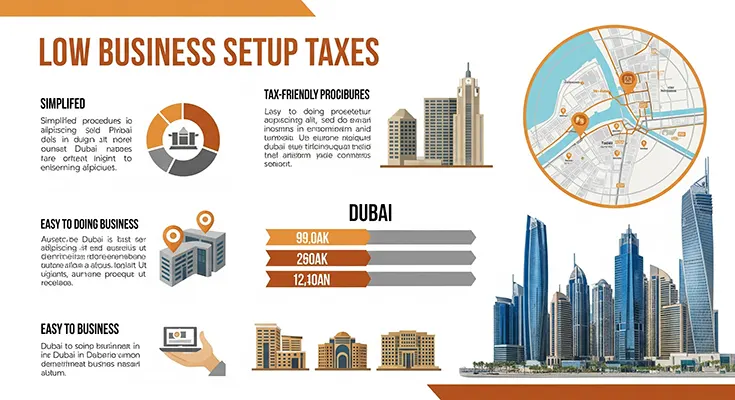Key Takeaways:
- Dubai has no personal income tax, allowing individuals to retain 100% of their earnings.
- A federal Corporate Tax of 9% was introduced in June 2023, but it applies only to profits exceeding AED 375,000.
- Free Zone companies can still benefit from a 0% Corporate Tax rate on “qualifying income” if specific conditions are met.
- A Value Added Tax (VAT) of 5% is applied to most goods and services, which is one of the lowest globally.
- The overall tax environment remains highly competitive and attractive for Business setup in Dubai.
Dubai has long been renowned as a tax-friendly jurisdiction, a significant draw for entrepreneurs and investors globally. When considering a Business setup in Dubai, the question “Are taxes low for business setup in Dubai?” is consistently at the forefront of their minds. The answer, in short, is a resounding yes, though the tax landscape has evolved with the introduction of a federal Corporate Tax. Despite this change, Dubai continues to offer a highly competitive and attractive tax regime that significantly benefits businesses and individuals alike.
Zero Personal Income Tax: A Major Advantage for Business setup in Dubai
One of the most compelling aspects of Dubai’s tax system, and a primary reason for its appeal, is the complete absence of personal income tax. This applies to all individuals residing and working in Dubai, whether they are UAE nationals or expatriates. This means that salaries, wages, investment income, and any other personal earnings are not subject to income tax deductions.
For entrepreneurs running a Business setup in Dubai, this translates into a substantial benefit. As a business owner, the profits you draw as personal income (e.g., as dividends or a salary from your company) are entirely tax-free at the individual level. This allows for higher disposable income and greater potential for personal wealth accumulation, making Dubai an attractive place not only to establish a business but also to reside. This zero personal income tax policy significantly distinguishes Dubai from many other major global economies, where income tax rates can be substantial, often consuming a large portion of earnings.
Corporate Tax: A Low Rate with Important Exemptions for Business setup in Dubai
Until recently, the UAE operated without a general Corporate Tax. However, a significant change occurred with the introduction of a federal Corporate Tax Law, effective for financial years starting on or after June 1, 2023. The standard Corporate Tax rate is 9% on taxable profits.
It is crucial to understand the nuances of this new tax for Business setup in Dubai:
- Threshold for Application: The 9% Corporate Tax rate applies only to taxable profits exceeding AED 375,000 (approximately USD 102,000) in a financial year. Businesses with profits below this threshold are subject to a 0% Corporate Tax rate. This means that small and medium-sized enterprises (SMEs) and startups, which often operate below this profit margin in their initial years, can still enjoy a tax-free profit environment.
- Scope: The Corporate Tax applies to profits earned by mainland businesses.
- Exclusions: Certain entities, like government entities, government-controlled entities, and qualified public benefit entities, are generally exempt from Corporate Tax.
Even with the 9% rate for higher profits, it remains significantly lower than corporate tax rates in many other developed economies, contributing to Dubai’s overall attractiveness for investment.
Free Zones and the 0% Corporate Tax for Business setup in Dubai
For businesses operating within Dubai’s extensive network of free zones, the Corporate Tax landscape offers even more favorable conditions. While free zone companies are now also subject to the new Corporate Tax Law and must register with the Federal Tax Authority (FTA), many can still benefit from a 0% Corporate Tax rate on their “qualifying income.”
To qualify for the 0% rate as a “Qualified Free Zone Person” (QFZP), a free zone company generally needs to meet several conditions, including:
- Maintaining adequate economic substance in the UAE free zone.
- Deriving “Qualifying Income,” which typically refers to income from activities conducted with other free zone businesses or income from outside the UAE.
- Not having elected to be subject to the 9% Corporate Tax.
- Complying with transfer pricing regulations and maintaining proper financial records.
This distinction means that free zone companies primarily engaged in international trade, services to other free zone entities, or activities that generate income from outside the UAE can effectively continue to operate in a 0% corporate tax environment. This makes free zones exceptionally appealing for businesses with a global focus or those that do not primarily target the UAE mainland market, reinforcing their competitive tax advantage for Business setup in Dubai.
Value Added Tax (VAT) and Other Indirect Taxes for Business setup in Dubai
While direct taxes (income and corporate) are very low or zero, Dubai, like the rest of the UAE, introduced a Value Added Tax (VAT) in 2018. The standard VAT rate is 5%, which is among the lowest VAT rates globally.
Key aspects of VAT for Business setup in Dubai:
- Registration Threshold: Businesses must register for VAT if their taxable supplies and imports exceed AED 375,000 per annum. Voluntary registration is available for businesses with taxable supplies and imports exceeding AED 187,500.
- Application: VAT is applied to most goods and services at each stage of the supply chain, with the end consumer ultimately bearing the cost.
- Zero-Rated and Exempt Supplies: Certain goods and services are zero-rated (0% VAT, allowing businesses to reclaim input VAT), such as exports, international transportation, and some healthcare and education services. Other supplies are exempt from VAT (no VAT charged, but businesses cannot reclaim input VAT), including certain financial services and residential property.
- Customs Duties: Generally, a customs duty of 5% is imposed on imported goods, though exemptions apply in free zones for goods re-exported or moved within the free zone.
- Excise Tax: Applies to specific goods deemed harmful to health or the environment (e.g., tobacco, energy drinks, carbonated drinks).
Despite the presence of VAT and some specific duties, the overall indirect tax burden remains modest, especially when compared to many other countries, further contributing to the low-tax environment for Business setup in Dubai.
How Can Meydan Free Zone Help?
For entrepreneurs seeking to leverage the significant tax advantages available for Business setup in Dubai, Meydan Free Zone in Dubai is particularly well-positioned. As a recognized Qualified Free Zone, Meydan Free Zone in Dubai enables businesses to benefit from the 0% Corporate Tax rate on qualifying income.This means that companies established in Meydan Free Zone in Dubai can continue to enjoy the lowest possible corporate tax liability, provided they meet the stipulated conditions for a Qualified Free Zone Person. Furthermore, Meydan Free Zone in Dubai facilitates a swift and efficient setup process, allowing businesses to quickly capitalize on these tax benefits. Their transparent fee structure and comprehensive support services ensure that businesses understand their tax obligations and remain compliant with FTA regulations, making Meydan Free Zone in Dubai an attractive choice for those whose primary concern is a truly low-tax Business setup in Dubai.


